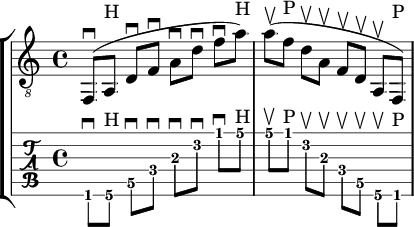Triadic arpeggios
Just notes of a chord played one by one
Arpeggios are nothing more than notes of a chord played one after the other. Lots of guitarists use arpeggios to break out from scale doodling so that their solos do not sound like a series of scale exercise licks.
The arpeggios you will learn in this exercise are called triadic arpeggios because the chords you are breaking are triads. They consist of the root, the minor or major third (this determines whether it's a major or a minor chord), and the fifth.
You will notice that most of these arpeggios are just fragments of scale positions that you may already know (if not, you will very soon).
Three forms of the minor arpeggio with sweeping
You will learn and practice three forms of the minor arpeggio and practice each one for three minutes.
When playing you will be playing the notes in succession from lowest to highest and vice versa. You will be playing them in one sweeping motion - meaning that when you change from a lower string to a higher one you will play always play a downstroke and when going from higher strings to lower strings you will always play an upstroke.
With this your picking hand will be moving in a smooth continuous sweeping motion. Let the downstroke and upstroke symbols on the tabs guide you.
D - Minor Arpeggio
The first arp is the D-minor arp in the first position (your index finger on the 1st fret!). Check out the diagram, you will see that you will only be playing three different notes (those that comprise the D minor chord).
Play it like this:

G - Minor Arpeggio
Then we have the G Minor. As in the first arp, check out what are the notes, which note is the root, so that you will know how to get other arpeggios by shifting the ones you know up and down the fretboard.
And the tabs:

D - Minor Arpeggio
And finally another D minor arp but with different root placement - again, learn where the roots lie so that you can shift these arps anywhere you like and play in any key.
